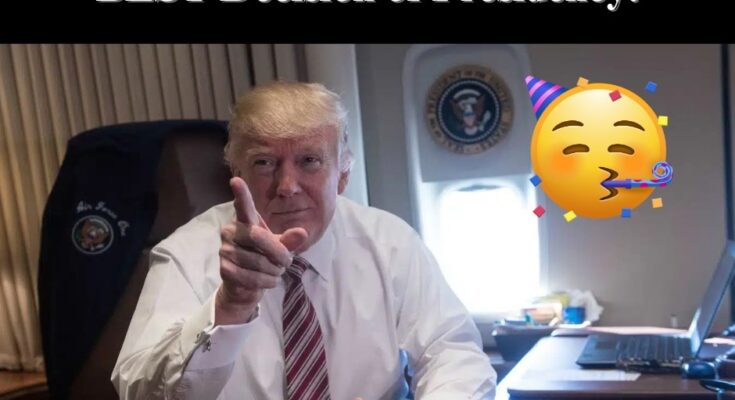Recent Polls and Policy Shifts: Trump’s Rising Approval and the DEI Debate
Recent polling data has revealed that President Donald Trump’s job approval rating has surged to a new high of 55% among registered voters. A survey conducted by Napolitan News in collaboration with RMG Research, which polled 3,000 voters between February 10 and 14, reported that 55% of respondents approve of Trump’s performance, with 43% disapproving—this, with a margin of error of 1.8%. This figure represents a notable increase from an earlier poll, which had indicated an approval rating of just 48%. Such a leap not only signals growing support among the American electorate but also arrives at a moment of transformative policy action within the federal government.
Concurrently, President Trump’s administration has announced a major policy shift on Diversity, Equity, and Inclusion (DEI) initiatives. Last month, Trump signed an executive order that dismantles DEI programs and staff within the federal government and extends this ban to federal contractors. This decisive move reflects a broader trend—both in government and the private sector—as many corporations have recently re-examined and, in some cases, scaled back their own DEI efforts. Together, these developments form a pivotal chapter in American politics, blending a surge in presidential popularity with a sweeping reorientation of governmental priorities.
In this article, we explore these interrelated developments in depth. We begin by analyzing the polling data and discussing what may be driving this surge in approval. Then, we examine the executive order on DEI, exploring its rationale, potential impacts on federal operations and corporate practices, and the legal debates it has ignited. Finally, we consider the broader implications of these shifts for future elections, policymaking, and the evolving dialogue over fiscal responsibility and social equity.
I. Rising Approval Ratings: What the Polls Reveal
A. The Latest Polling Data
A recent survey conducted by Napolitan News and RMG Research—a robust study of 3,000 registered voters over a five‑day period in mid‑February—has shown that President Trump’s approval rating has reached 55%, a record high compared to earlier figures. With a margin of error of just 1.8%, these numbers suggest that a clear majority of voters now view his performance favorably. In contrast, a separate poll released just days before indicated a rating of 48%, highlighting significant variability in public opinion as different methodologies and sample sizes are applied.
Political analysts note that these rising numbers may be driven by a confluence of factors. Many voters credit Trump’s administration with decisive actions on issues such as government spending, border security, and the fight against what his supporters call bureaucratic corruption. In particular, his aggressive stance on curtailing DEI initiatives and redirecting federal priorities toward efficiency and national security resonates with a sizable segment of the electorate. With 82% of Americans, according to some data cited by Trump’s team, believing that “the system is corrupt,” his message of reform and accountability finds an increasingly receptive audience.
B. Contextualizing the Approval Surge
Historically, a president’s approval ratings have fluctuated in response to a variety of factors—economic conditions, foreign policy challenges, and domestic controversies, among others. For President Trump, the current approval surge occurs at a time of heightened political polarization. Supporters argue that his policies, including the recent executive order dismantling DEI programs, are necessary corrections to a system plagued by inefficiency and perceived corruption. They believe that by eliminating what they see as wasteful initiatives, the administration is streamlining government functions and restoring accountability.
This narrative has struck a chord among voters who are increasingly frustrated by what they perceive as excessive government spending and entrenched bureaucratic mismanagement. For many, Trump’s willingness to take bold, even controversial, actions signals a return to a form of governance that prioritizes fiscal responsibility and a focus on national security. This mix of economic pragmatism and a tough stance on law and order appears to be galvanizing support, as evidenced by the notable rise in his approval ratings.
C. Implications for Future Elections
The surge in Trump’s approval rating carries significant implications for upcoming elections, particularly the 2026 midterm contests and beyond. For Republicans, these numbers are a clear indicator of a strong and energized base that remains deeply committed to Trump’s vision. This support not only bolsters his personal political capital but also lays the groundwork for potential endorsements and influence over the party’s future direction.
For Democrats, the rising numbers signal a need to rethink their messaging and policy proposals. As public disillusionment with what many perceive as systemic corruption and inefficiency grows, Democrats face the challenge of offering a compelling alternative that addresses these concerns while reasserting their commitment to social justice and equity. In an environment where a majority of voters now appear to support Trump’s reform agenda, the competitive dynamics of future elections may shift dramatically.
II. The Corporate Retreat from DEI: A Shift in Priorities
A. Executive Action on DEI in the Federal Government
In a bold policy move last month, President Trump signed an executive order that effectively dismantles Diversity, Equity, and Inclusion (DEI) programs within the federal government. This order not only cuts DEI-related policies and staff positions in federal agencies but also extends the prohibition to federal contractors. The administration argues that DEI initiatives have outlived their purpose, claiming that billions of dollars are wasted on programs that, rather than fostering inclusion, actually promote divisiveness and intergroup conflict.
In official statements accompanying the order, President Trump asserted that DEI programs create an environment of bias and hostility, diverting valuable resources away from more critical functions like national security and efficient governance. By eliminating these programs, Trump’s administration intends to refocus government spending on measures that are deemed to have a direct, tangible impact on efficiency and fiscal responsibility. This move is emblematic of a broader conservative critique that views DEI initiatives as an unnecessary distraction from the core functions of government.
B. Private Sector Reactions and Corporate Shifts
The impact of this executive order extends beyond the public sector. In recent months, several major corporations—including Amazon, Walmart, Target, and Meta—have begun to reassess their own DEI strategies. Facing growing pressure from shareholders and an evolving legal landscape, many companies have signaled a willingness to scale back on what they see as politically motivated initiatives.
For instance, during recent earnings calls, executives from these companies have discussed the challenges of maintaining DEI programs amid increasing scrutiny over their cost and effectiveness. While some firms remain committed to fostering diverse and inclusive workplaces, others are rethinking their approach in light of regulatory changes and the shifting priorities of the federal government. Notably, while Costco has resisted calls to abandon its DEI initiatives, other companies are taking a more cautious approach—reallocating resources to areas seen as more directly beneficial to their bottom lines.
C. Legal and Financial Implications for Corporations
The decision to eliminate DEI programs carries significant legal and financial implications for corporations. Companies that continue to invest in DEI may find themselves facing increased legal challenges, particularly if their initiatives are perceived as contravening new regulatory directives or judicial precedents. Critics argue that DEI efforts, when implemented in a way that emphasizes demographic characteristics over merit, could lead to claims of reverse discrimination and expose companies to costly litigation.
At the same time, proponents of DEI contend that diversity is a critical driver of innovation and competitiveness. They argue that a diverse workforce brings a broader range of perspectives, which can lead to better decision‑making and improved corporate performance. However, in the wake of Trump’s executive order, the legal environment appears to be shifting toward a more restrictive interpretation of how diversity should be promoted in both the public and private sectors. This evolving landscape may force companies to strike a delicate balance between maintaining their commitments to inclusion and mitigating the risks of legal challenges.
For many corporate leaders, the current trend is a signal to reassess DEI programs and ensure that they are structured in a way that aligns with new legal standards and regulatory expectations. In doing so, companies hope to avoid potential penalties while still reaping the benefits of a diverse workforce.
III. Intersection of Political Approval and Policy Shifts
A. The Link Between Public Opinion and Government Action
The surge in President Trump’s approval rating and the sweeping changes in DEI policies are closely intertwined. For many voters, Trump’s rising popularity is linked to his willingness to take decisive action against what they perceive as a corrupt and inefficient system. By targeting DEI initiatives—viewed by his supporters as emblematic of unnecessary political correctness and wasteful spending—Trump reinforces a narrative of reform and accountability.
This narrative resonates with a significant portion of the American electorate, as reflected in the latest polling data. Voters who are frustrated by government inefficiency and entrenched bureaucratic practices see the elimination of DEI programs as a necessary step toward streamlining federal operations and reducing waste. In this way, the administration’s policy shifts are not just abstract policy decisions; they are concrete actions that align with the values of a broad base of supporters.
B. Impact on Corporate Behavior and Public Debate
The retreat from DEI initiatives in both government and the private sector is rapidly becoming a central theme in national debates. Supporters of Trump’s policies argue that scaling back DEI programs will lead to a more merit‑based system, where hiring, promotions, and resource allocations are determined solely by performance rather than identity. This approach, they claim, will foster a fairer and more efficient workplace, ultimately boosting economic growth and competitiveness.
However, this shift also sparks heated debate among advocates for social justice, who contend that DEI initiatives are crucial for addressing historical inequalities and promoting a more inclusive society. The evolving discourse has significant implications for how corporations operate and how political leaders craft their messaging. As businesses reassess their strategies, public debate is likely to intensify, with legal battles and legislative challenges shaping the future of workplace diversity in America.
C. Implications for Future Elections
The intertwining of rising approval ratings with decisive policy actions carries important implications for future elections. For Republicans, the combination of strong public support and bold policy moves offers a strategic advantage heading into the 2026 midterm elections and beyond. A record‑high approval rating not only bolsters Trump’s personal standing but also reinforces the credibility of his broader reform agenda.
For Democrats, the current political climate presents a formidable challenge. With a growing segment of the electorate embracing Trump’s vision of fiscal discipline and streamlined government, Democrats may need to reassess their own policy priorities and messaging strategies. The dynamic between public opinion and policy decisions will be a critical factor in shaping electoral outcomes, influencing how both parties adapt to shifting voter expectations.
IV. The Broader Political and Legal Landscape
A. Congressional and Judicial Reactions
The recent policy changes and rising approval ratings are part of a larger political and legal landscape characterized by intense partisan debates. In the wake of the Supreme Court’s recent decisions—particularly those related to affirmative action—there is an ongoing reexamination of how diversity and inclusion policies are implemented across the nation. Lawmakers on both sides of the aisle are grappling with the implications of these changes for federal and state policies, as well as for corporate practices.
Republican lawmakers have largely embraced Trump’s actions, arguing that they represent a necessary correction to decades‑long policies that have, in their view, prioritized identity politics over merit. Conversely, Democrats and immigrant rights advocates warn that dismantling DEI initiatives could exacerbate social disparities and undermine efforts to promote equal opportunity. This stark divide highlights the complex interplay between legal rulings, executive actions, and public policy—and underscores the challenge of navigating a deeply polarized political environment.
B. Future Legislative and Judicial Reforms
Looking ahead, the interplay between Trump’s soaring approval ratings, his policy shifts, and ongoing legal debates is likely to shape future legislative and judicial reforms. With strong public support for a government that emphasizes accountability and efficiency, future legislation may increasingly reflect the priorities of those who favor a limited role for DEI initiatives in both public and private sectors.
Potential legislative reforms could include:
-
- Enhanced Oversight Mechanisms: Strengthening the processes by which federal funds are allocated and spent, with a focus on eliminating waste and corruption.
- Revised Regulatory Guidelines: Updating legal standards governing how race, gender, and other factors are considered in hiring and promotion practices to align with new judicial interpretations.
- Increased Transparency Measures: Mandating greater public disclosure of corporate and government financial data, thereby fostering an environment of accountability and trust.
Judicial decisions in upcoming cases—especially those related to the Commerce Clause and the balance of power between federal and state authorities—will further influence how these reforms are implemented. As legal challenges continue to shape the regulatory environment, the evolving role of the judiciary will be critical in determining the future of American governance.
C. Impact on Energy Policy and Corporate Accountability
Although the immediate focus of recent developments is on fiscal reform and DEI policy, there are broader implications for corporate accountability and energy policy. Republican‑led states have long argued that state‑level lawsuits targeting major oil companies could disrupt the national energy system. By upholding federal standards through initiatives like the Corporate Transparency Act, the Court reinforces the idea that nationwide consistency in regulatory oversight is essential.
This ruling—and the broader push for corporate transparency—may lead energy companies and other large corporations to adopt more rigorous internal practices. In an environment where the disclosure of corporate ownership is mandatory, companies might be compelled to increase their efforts to ensure ethical practices and avoid potential legal repercussions. Such changes could foster a culture of accountability that benefits not only investors but also the public at large.


